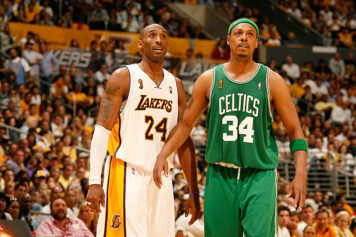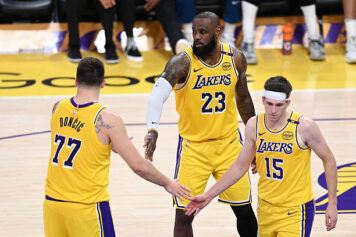The Black Knights who made Mets baseball lit in the 80s.
For baseball fans planning to watch tonight’s MLB All-Star game at Citi Field, the game will have varying degrees of significance. To some, it’s merely an exhibition to pass time until the “real” season returns. For others, it’s entertainment and a chance to witness the annual light-hearted gathering of MLB kings.
On Monday, Dwight Gooden and Darryl Strawberry were together again in the first all-star weekend at CitiField, helping lead the NL celebrity squad to an 8-5 win. They stood tall as proud ambassadors of that ’86 Mets championship team that owned NY like Gabrielle Union rocks a pair of Christian Louboutin pumps.
The All-Star Game has always been a must-see, dating back to my youth as a baseball player and avid fan in Queens, NY. I have many fond ASG memories; from Bo Jackson’s mammoth, leadoff homer in the ‘89 game, to interviewing game MVP Derek Jeter at the ’00 game in Atlanta.
My fondest and most cherished all-star memory occurred when I was an impressionable 10-year-old Mets fan in search of a hero (besides my pops). Back then, it wasn’t hard to find a black face to embrace in MLB. In fact, guys like Dwight Gooden and Darryl Strawberry made that MLB dream seem very attainable to shorties like me, and the “old” Shea Stadium was the place to be on a Friday night in July with the fam.
There was no better moment for me than when Gooden “AKA” Dr. K –– just 19 and two years out of high school—became the youngest player to rep in an All-Star game. The Tampa native not only made an appearance in the ’84 Classic, he awed everyone in attendance by striking out the sides in sick-soldier fashion.
First Lance Parish went down whiffing. Then Gooden gassed Chet Lemon and Al Davis with a rising heater, which lifted players out of their cleats and fans out of seats.
Strawberry was a 22-year-old, man-child back then too. Scouts called him “The Black Ted Williams.” As a 6-6, five-tool phenom from Crenshaw with freakish power, deer-like speed, and a graceful game, Straw hit the scene like a winding tornado, winning the ’83 NL Rookie of the Year Award. He singled in the fifth inning and stole a base off of Detroit Tiger’s wizard Jack Morris, in the same all-star game.
Back then, kids wanted to be Doc and Darryl. I’m talking about kids who didn’t want to be baseball players when they grew up. These cats were black superheroes. The kind Jay-Z and Lil’ Wayne and Lebron James are now packaged as.
Baseball players in general, don’t resonate with the masses like in the past. Unless you are really into the game, kids from the hood don’t say they want to be Andrew McCutchen or David Price. The appeal is different now.
Gooden and Straw blew up in the Rotten Apple during the “Crack Era,” and lived rock star lifestyles. The drug scene was thriving and coke was the elite drug of choice. Then crack popped, and for many of our heroes, that was the hump that broke the camel’s back.
As a young, black baseball fan growing up in the heart of Metsland, these guys brought me nothing but pride. I never felt personally let down. Even when they fell victim to drugs and alcohol, because they gave me too many dope moments.
The same way Amy Winehouse and Kurt Cobain fans celebrate their lasting musical legacies, rather than wallow in the tragedy of their premature deaths—I maintained my allegiance to my heroes. While Darryl and Dwight survived their grapple with substance abuse, we still sadly witnessed the death of sure-shot Hall of Fame careers.
They both were publicly humiliated and received suspensions for various substance abuse infractions.
I remember in 1987 when legendary New York sports columnist Dick Young wrote a column urging Met fans to stand up and boo Gooden upon his return from a cocaine suspension. Young had old school values and was big on holding athletes to the same moral standards as the rest of society. He roasted every ethnicity and ilk, from wife-beaters to druggies, if need be. People often accused him of being a racist, but in this case, it wasn’t like that.
It was, however, my first encounter with the athlete double standards. Doing drugs has been a rite of passage—a badge of honor even—for other types of entertainers. When athletes indulge, it’s considered the devil’s work and they are stained forever.
I was kind of tight about that column. I remember having an argument with a kid in junior high school about it. He said his dad agreed that fans should boo Dr. K. I thought homie was nuts. I’d never boo my heroes no matter what. Maybe I was too young to understand how “bad” their transgressions were.
For years after, I listened to the sports world characterize these brothers as tragic examples of fast living, lack of discipline and the consequences of using drugs.
In reality, as seasoned adults, they are fine examples of growth and maturity. They were able to channel demons, admit mistakes, rebuild reps and write new, respectable chapters in Mets history.
The only lingering regret is that we didn’t get to see them at 100 percent, in their primes. It never happened. All that’s left is some magical moments and an endless stream of what ifs.
That’s why All-star weekend is dope to me, especially the celebrity softball game featuring a mixture of movie stars, social media big dawgs and many of the all-time great MLB cats.
So while All-star weekend is not everybody’s thing, it reminds me of two black baseball players for the NY Mets, who created lasting, deeply-impressed passion for baseball in my heart.



